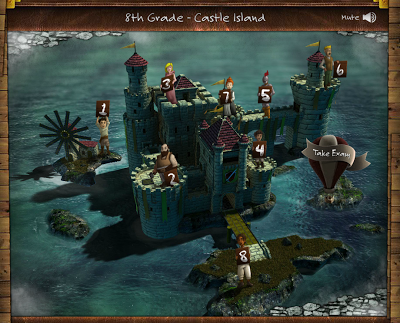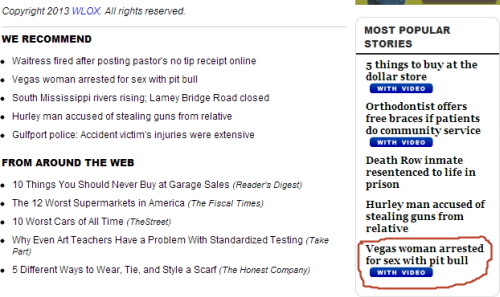 |
| Add caption |
More on cycling
We recently discussed the effect of bicycle helmet laws on cycling safety. Now we learn that cycling itself is a hazard to the environment. According to Washington state Rep. Ed Orcutt (R-Kalama), cyclists are exhaling so much carbon dioxide that they are contributing to global warming. The representative sees a tax on cyclists as a reasonable response to generate needed revenue for road maintenance and to offset the environmental damage.
 |
| Click to enbiggen. via KGW |
One of an occasional series.
A bunch of years ago, I worked for a software company. It was hard work for long hours. At one point, senior management made the pronouncement that the development team needed to focus more on a particular aspect of the product. The QA manager and I agreed that we’d be Focused More-ons.
Safety through fear
A review of bicycle helmet laws shows that more laws reduce cycling-related head injuries. They also reduce non-head injuries and increased head injuries in other sports. Put simply, campaigns to promote helmet-wearing appear to be most effective in making people too afraid to ride their bikes.
Dave Horton, a sociologist at Lancaster University, amplifies these findings in a series of essays that show how the media and civic leaders of present cycling as a strange, reckless, and dangerous practice.
I routinely see similar effects with regard to online safety. We’ve made sensible people of all ages afraid because somewhere, someone has done something bad. The Internet is a dangerous place where bad people are armed with malware that will steal your money, identity and/or children.
Mississippi TV station WLOX reports on an FBI program that educates kids on online safety. “We need to be able to educate these children to the dangers and the issues that they’re going to face online,” said FBI Special Agent Scott Wells.
Safe Online Surfing is an educational game that teaches young people about cyber words, cyberstalking, and how sketchy websites are trying to steal your identity. (It’s also a game done in Flash, meaning that people who iPads or other mobile devices can’t play it.)
 |
| FBI Safe Online Surfing |
Guess the wrong answer and you deprive an underwater princess of air. Predators, we learn, will try to lure you in with inappropriate topics, not try to win your trust by playing a game.
Indeed, the web is a troublesome place, as demonstrated by the WLOX viewers whose fifth most popular news story is, well, this. With video.
(h/t to MeFi)
Mr. Hakkarainen goes to Helsinki
If you refer to blacks as niggers but don’t call yourself a racist, then you’re not a racist. So said Timo Soini, leader of the True Finns party in a BBC Hard Talk interview. (The video clip does not play on mobile devices. When I find an audio link, I will update this post.)
Soini was defending his party leadership when the interviewer asked about Tuevo Hakkarainen, who had used neekeri-sanan in a speech in Parliament. “Don’t use that kind of language,” said Soini.
He went on to say that it isn’t OK to use that kind of language, even if you’re not a racist. “You should be improving in your behavior.”
This post is one of a series about Teuvo Hakkarainen, the True Finns Party MP from Viitasaari. For the record, my grandfather was born in Viitasaari.
More on sacred texts
Sandra’s father’s family hails from a red-clayed corner of the Great White North. To the folks of Prince Edward Island, Anne of Green Gables is a sacred text. To many Japanese girls, the Anne stories are an inspiration beyond words. These stories tell of an orphan girl who is a adopted by an aging brother and sister and who thrives by wit, pluck, and imagination. There was a mix-up in the request to the Halifax orphanage. The couple was looking for a boy to help around the farm while the person arranging the adoption thought that they were looking for a girl about 11.
At the core of the story is the girl’s determination to survive life as a red-head. On first meeting, Matthew Cuthbert remarks that her hair is red.
“Yes, it’s red,” she said resignedly. “Now you see why I can’t be perfectly happy. Nobody could who has red hair. I don’t mind the other things so much–the freckles and the green eyes and my skinniness. I can imagine them away. I can imagine that I have a beautiful rose-leaf complexion and lovely starry violet eyes. But I cannot imagine that red hair away. I do my best. I think to myself, `Now my hair is a glorious black, black as the raven’s wing.’ But all the time I know it is just plain red and it breaks my heart. It will be my lifelong sorrow. I read of a girl once in a novel who had a lifelong sorrow but it wasn’t red hair. Her hair was pure gold rippling back from her alabaster brow. What is an alabaster brow? I never could find out. Can you tell me?
Because the Anne books are in the public domain, anyone can publish a new edition and publish they do. There are innumerable print and electronic editions as well as movie, television, and cartoon remixes. What’s newsworthy about another edition of a book about an 11-year-old, red-haired girl?
Here’s what:
 |
| Cover photo via Techdirt |
As you’d expect, this edition, its cover since removed from the Amazon listing, unleashed a torrent of vitriol comparable to what might happen if a favorite sports hero appeared in a porn flick.
One takeaway message from all this is that, through our copyright laws and freedoms of press and speech, we can bring to market pretty much any full-tilt bozo idea of our choosing.
More on science
Three quick notes on the ways that science making our lives, um, interesting.
- We’ve often heard that printer ink is more expensive than human blood. Well, here’s a twist: UK scientists have used 3D printers to print human stem cells. It’s within the realm of imagination that we could eventually use human blood in printers to make something beyond our imaginations.
- Humans have had a problematic relationship with insects. Some, such as honey bees, do great things for us. Mosquitoes are frog food and carry deadly diseases. We’ve done battle with chemicals and bazookas.
Well, insects are fighting back and they’ve got robots. - Fish are in schools but, until science showed up, they could never raise their hands when the have an answer to the teacher’s question. The Register reports that Fish grow ‘hands’ in genetic experiment.
Fish testing at Alden Research Lab
One of a occasional series. A bunch of years ago, I worked for a software company. It was hard work for long hours. At one point, senior management made the pronouncement that the development team needed to focus more on a particular aspect of the product. The QA manager and I agreed that we’d Focused More-ons.
Silicon places
In the early days of the Intertubes, many locations tried to become the next Silicon Valley, if only in name.
We saw Silicon Alley, Silicon Gulch, and a bunch more that are just out of reach of memory.
With this GlobalPost article, Far from San Francisco and New York, Silicon Prairie emerges, marketers are trying to turn corn into silicon.
This Google Trends chart shows the bursts of interest in a few Silicon names.
The best overall list that I found is in good old Wikipedia with its List of places with “Silicon” names. It was there that I learned that Silicon Sandbar (Cape Cod) washed away in 2008.
Bootnote: I’ve tried various search engines to find a way to search for “Silicon *” as a place name. It was only as I loaded up a search with all of the names that I could recall that I found the Wikipedia page.




